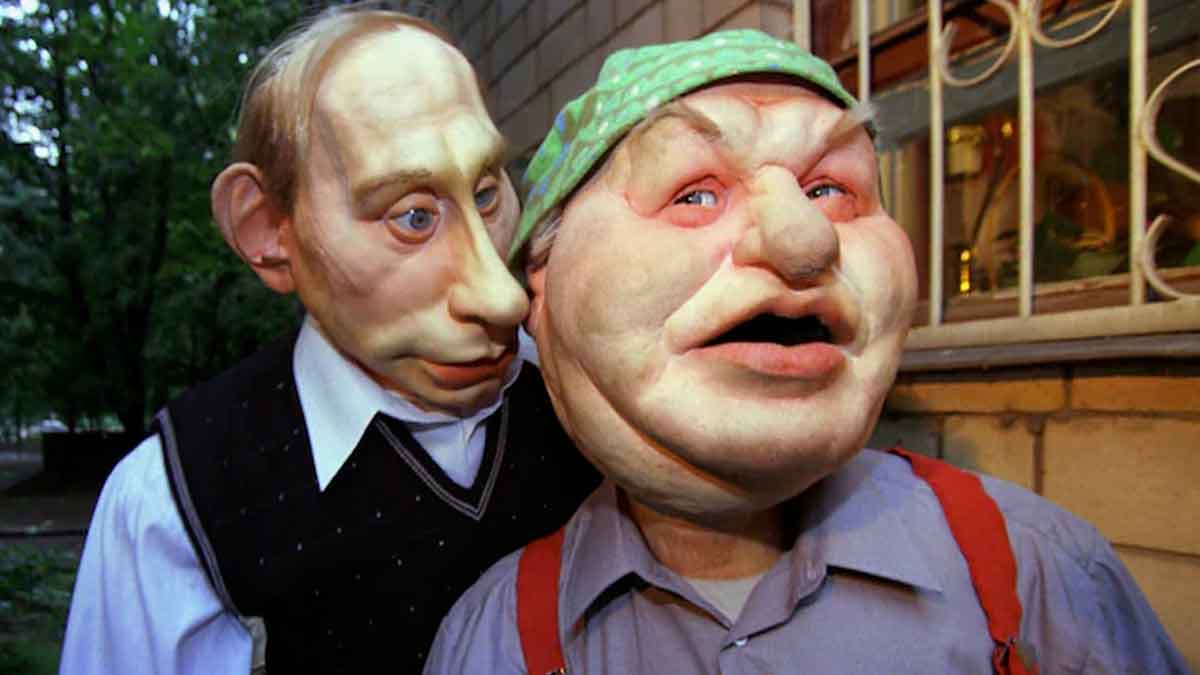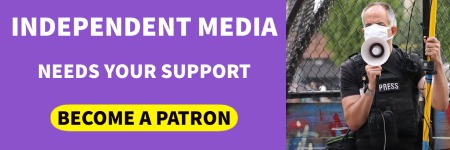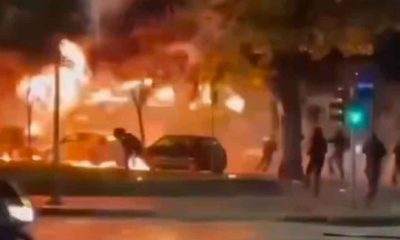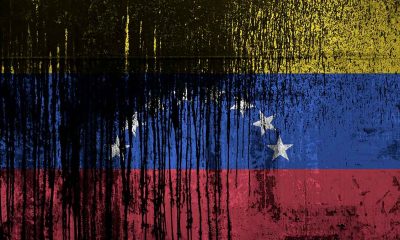National
The United States is Following a Dark Path
The cancellation of Jimmy Kimmel Live! parallels President Vladimir Putin’s 2002 order to cancel the puppet show, Kukly.

American broadcast network ABC announced it was canceling the late-night show Jimmy Kimmel Live!, joining CBS’s earlier cancellation of Late Night with Stephen Colbert.
Jimmy Kimmel ran afoul of President Donald Trump for comments made last Friday about the assassination of Charlie Kirk, and suggested the MAGA party was doing everything to attach blame to anything other than polarized politics within the political right.
On Tuesday, after Trump posted a series of social media posts calling for ABC to be investigated and have its broadcast license removed, FCC Chairman Brendan Carr accused the network of spreading misinformation to a “narrow audience” and called for the cancellation of Jimmy Kimmel Live!
Network executives obliged, and in the immediate aftermath, emboldened supporters within MAGA are already calling for more control of the network. U.S. news outlet Rolling Stone reported that two sources inside ABC, which Disney owns, said that network executives did not believe Kimmel had crossed any red lines, but canceled the show out of fear that further action would be taken.
In the media and entertainment space, the power of Disney’s lawyers is so strong that it has become a meme. South Park has produced multiple episodes about Disney’s legal and political power, and even within our pages, when a statue appeared in Odesa of a Russified Darth Vader, we joked that Ukraine should be cautious, lest officials want to get sued. The mouse backing down this easily is a political earthquake.
The U.S. has stepped to the edge before, but never crossed the line
I have been reluctant to sound the alarm about creeping authoritarianism within the United States and how democratic institutions are being dismantled. Until today, the U.S. has been here before. In the 1930s, during the Great Depression, over one million U.S. citizens of Mexican descent were deported without cause. In World War II, tens of thousands of Japanese were sent to “internment camps” with no due process in the name of national security, while Germans, Italians, Hungarians, and Romanians walked freely. Almost all lost their homes, businesses, and wealth, and were released with nothing.
There was McCarthyism in the 1950s, Hollywood black lists, and the Red Scare. In 1952, the FBI revoked British citizen Charlie Chaplin’s visa, forcing him to live in semi-exile in Switzerland. He didn’t return until 1972 to receive an honorary lifetime achievement award from the Academy of Motion Picture Arts and Sciences. In a bitter twist of irony, Chaplin warned the world about the perils of authoritarianism in the movie The Great Dictator.
Smaller examples include Eisenhower pressuring the producers of the Adventures of Rocky and Bullwinkle to tone down the anti-Soviet tones in the show. Antagonists Boris Badenov and Natasha Fatale suddenly hailed from the vaguely Eastern European nation of Pottsylvania, and Dear Leader was drawn to appear and sound like a Nazi.
In 1970, White House aide to President Richard Nixon, Tom C. Huston, wrote a 43-page plan to conduct domestic surveillance, harassment, and reprisals against American citizens who defied the administration. The Huston Plan became public in 1973, as part of the Watergate Investigation. Ultimately, Nixon was told by party leaders he had two choices. Resign on his own terms, or face certain impeachment and criminal prosecution. On 9 August 1974, Nixon resigned.
The events of the last 48 hours exceed McCarthyism, and Phase Two of Project 2025 goes well beyond the Huston Plan. Today’s actions by the Trump administration directly parallels events that occurred in 2002 in Russia.
Hurt feelings over puppets shut down a Russian TV network
In 2002, Putin pressured Russian TV channel NTV to end the production of Kukly, a political satire puppet show that frequently skewered him. A year later, NTV was forced to shut down. The show’s creator, Viktor Shenderovich, was forced to flee Russia due to death threats and government harassment. With 22 years of hindsight, Eastern European and Russian experts see this as the first step backwards for a Russian democracy that was only nine years old.
In the years that followed, political parties were outlawed, the free press fell completely under state control, the courts were taken over, and Putin’s United Russia party took over every corner of government at the local, federal, and national levels.
Political opposition was initially harassed and investigated, then beaten, and ultimately imprisoned as human rights abuses became normalized.
In 2016, Putin reinstated the Soviet-era Otryad Mobilniy Osobogo Naznacheniya (OMON), the Special Purpose Mobile Unit, with the organization reporting to the presidential office. A subset of the Rosgvardia, OMON was established as a federal organization to address internal terrorism and unrest.
Twenty-three years after Putin suffered a moral injury from puppets, Russia is an isolated nation, exposed as a paper tiger, embroiled in war on two continents, with an economy in ruins. Russia’s Internet is the fourth most restricted in the world, behind Iran, China, and North Korea.
The little thaw of the late 1990s and early 2000s has given way to a stunning concentration of wealth. Almost 25% of Russia’s annual GDP is generated by Moscow and St. Petersburg. The rest of Russia lives in a peculiar blend of 1970s Soviet malaise and 2019 Western technology. People still live in Brezhnevkas while scrolling RuTube on an iPhone. In the vast, crumbling east, dotted by abandoned Soviet-era cities and disappearing villages, some still live like it’s 1925.
The promised return to greatness has given way to a curated message of national victimhood. State media and the government tell its people the nation is being targeted by every power in the world for extermination because of Russophobia. And in the same ragged breath, the Russian people are told their state has no borders, and anywhere a Russian soldier stands belongs to Russia.
The way the “real Russia” lives is a modern tragedy, considering that the Russian Federation spans over 11% of the world’s entire landmass. The projected value of Russia’s natural resources is estimated to be between $75 trillion and $100 trillion. The U.S. is in second place, with a paltry $45 trillion.
Putin created a system where the oligarchs who helped him come to power continue to accumulate wealth while the Kremlin maintains a high degree of control over industry. Unofficially, Putin is believed to be the wealthiest person on the planet, with hundreds of billions in hidden assets.
Yes, I believe that the United States has taken the first step on a very dangerous path, and the Trump administration is consolidating its power outside of the legislative and judicial branches of government to establish an authoritarian government. The best-case scenario is Orbanization, the worst-case scenario is Putinism, or something worse the world has yet to see.
There is not a single example in world history where authoritarianism, dictatorship, or fascism has led to a better quality of life for the people living under its rule. Unlike Putin in Russia, who spent 20 years establishing absolutely control, the Trump administration is moving at a much faster speed and is virtually unchecked.
I don’t care, I voted for this
If you’ve read this far and you’re thinking to yourself, “This is just a load of fearmongering bullshit,” I ask you to consider this. When Putin started the largest political purge in Russia since Stalin in 2023 after the Prigozhin Insurrection, the list of potential enemies of the state was short. Political parties had already been banned. The state fully controlled the media. Journalists were already jailed en masse. Minority groups such as the LGBTQ community were already criminalized and marginalized, and antisemitism was just barely out of sight. Ukraine and Islamic extremism were already declared existential external threats to the state. Thousands of vocal government opponents had already fled by 2022.
So who did the Kremlin turn against? The new enemy became what the State Duma labeled “turbo patriots.” Loyal followers of Putin and the Russian world, whose only criticism was that the Kremlin wasn’t going far enough. They were demanding more repression, more arrests, more prisons, more censorship, a state religion rooted in the Russian Orthodox Church, and more war.
By the fall of 2023, loving your country too much became a crime. Dozens of outspoken high-profile turbo patriots have since died under mysterious circumstances, been fined and harassed into silence, or imprisoned. The most famous one of all is FSB Colonel Igor “Strelkov” Girkin, who was the first Minister of Defense of the so-called Donetsk People’s Republic and self-admitted that he personally started the kinetic war, under Russian orders, in the Donbas against Ukraine.
Today, Girkin is serving a 4.5-year sentence for criticizing the Russian Ministry of Defense for withholding bonus pay to Russian soldiers, convicted of spreading fakes about the Russian Federation Armed Forces. His trial was held behind closed doors and deemed a state secret. There were small groups of protesters, with dozens arrested. Attempts to secure legal permits were blocked due to “COVID restrictions.”
History has a warning for you. An autocratic state never relinquishes control, and one day, even the most loyal party members become the enemy. Without institutionalized fear, an autocratic government cannot survive, and it is forced to start to eat itself.










